2016 年广西普通高中会考英语真题及答案
第一部分 听力理解(共两节,满分 20 分。温馨提示:请在答题卡上作答,在本试题上作
答无效。)
第一节(共 5 小题;每小题 1 分,满分 5 分)
听下面 5 段对话,每段对话后有一个小题,从题中所给的 A、B、C 三个选项中选出
B.Swimming.
C.Table tennis.
最佳选项,并在答题卡上的相应位置将该项涂黑。听完每段对话后,你都有 10 秒钟的时
间来回答有关小题和阅读下一小题。每段对话读两遍。
1.What sport does the man like the most?
A.Basketball.
2.What will the speakers do this weekend?
A.Have a picnic.
3.How will the woman get to Lake Street?
A.By bike.
4.What does the man want?
A.Tea.
5.When does the conversation take place?
A.At 7:00. B.At 8:00.
第二节(共 15 小题;每小题 1 分,满分 15 分)
B.Go shopping. C.See a film.
B.On foot.
C.At 9:00.
C.By bus.
B.Coffee.
C.Water.
听下面 5 段对话或独白,每段对话或独白后有几个小题,从题中所给的 A、B、C 三
个选项中选出最佳选项,并在答题卡上的相应位置将该项涂黑。听每段对话或独白前,你
将有时间阅读各小题,每小题 5 秒钟;听完后,各小题将给出 5 秒钟的作答时间。每段对
话或独白读两遍。
听第 6 段材料,回答第 6~7 小题。
6.Where are the speakers?
A.In an office. B.In a hotel. C.In a restaurant.
7.How long did the woman wait?
A.About half an hour. B.About an hour. C.About two hours.
听第 7 段材料,回答第 8~9 小题。
8.Who will be a volunteer?
A.Tom. B.Sam. C.Lisa.
9.What are the speakers talking about?
A.The holiday plan. B.The school life. C.The future job.
听第 8 段材料,回答第 10~12 小题。
10.What does Alex do on Saturday morning?
A.Have tea.
11.Who does Alex visit on Sunday?
A.His friends.
12.What does Alex read on weekend evenings?
A.Books.
C.Newspapers.
听第 9 段材料,回答第 13~15 小题。
13.Why is the man at the shop?
A.To get a bike repaired.
14.What colour does the man want?
A.Red.
15.When will the man probably come back?
A.In three days.
听第 10 段材料,回答第 16~20 小题。
16.What is the speaker?
A.A student. B.A doctor. C.A teacher.
B.His grandparents.
C.His neighbors.
B.In four days.
C.In five days.
C.Play sports.
B.Make cakes.
B.Magazines.
B.To get a bike changed. C.To buy a new bike.
B.Black.
C.Green.
�
17.How many clubs is the speaker talking about?
A.Two. B.Three. C.Four.
18.When do the reading club members meet?
A.On Monday.
19.Where do the cyclists go riding?
A.On the campus. B.Along the river bank. C.Around the lake.
20.How can you find more information about the clubs?
A.Go to the library.
B.Go to the office.
B.On Wednesday.
C.On Saturday.
C.Go to the website.
第一节(共 10 小题;每小题 2 分,满分 20 分)
阅读下列短文,从每题所给的 A、B、C、D 四个选项中,选出最佳选项, 并在答题卡上的
相应位置将该项涂黑。
A
“Everything happens for the best,” my mother said whenever I faced
disappointment. “If you can carry on, one day something good will happen.”
After graduating from college in 1932, I decided to try for a job as a sports
announcer (播音员) on the radio. I took the bus to Chicago and knocked on the
door of every radio station. But I was refused every time. In one studio, a
nice lady told me that big radio stations didn’t want to accept inexperienced
(没经验的) persons. “Go to the countryside and find a small station that’ll
give you a chance,” she said.
I returned home, Dixon in Illinois. My father said Smith Ward had opened a
store and wanted a local sportsman to manage its sports department. Since I
had played high school football in Dixon, I applied. The job sounded just
right for me, but I still failed in the interview. As I left his office, I
felt sad. I asked aloud, “How can a man become a sports announcer if he can’
t get a job in a radio station?”
I was waiting for the lift when I heard Smith Ward calling, “What did you say
about sports? Do you know anything about football?” Then he made me stand
before a microphone and asked me to broadcast an imaginary (想象的) game. As a
result, I did a wonderful job and was told to broadcast Saturday’s game!
On my way home, I thought of my mother’s words again: Everything happens for
the best if you carry on. One day something good will happen.
21.When did the writer graduate from college?
A.In 1931. B.In 1932.
22.The nice lady suggested that the writer should look for a job in ________
.
A.a small station B.a big station
23.Who opened a store and wanted a local sportsman?
A.The writer. B.Smith Marx.
C.The writer’s father. D.Smith Ward.
24.Finally, the writer was asked to broadcast ________.
A.Thursday’s game
C.Saturday’s game
25.According to the text, “Everything happens for the best if you carry on”
means that
A.you will make money if you keep on trying
B.you will lose money if you keep on trying
C.you will succeed if you keep on trying
D.you will fail if you keep on trying
B.Friday’s game
D.Sunday’s game
C.a small city
D.a big city
C.In 1933.
D.In 1934.
________.
�
B
Jack worked for the Canadian government. One day, he was told to learn
more about wolves. Do wolves kill lots of caribou (北美驯鹿)? Do they kill
people?
The government gave Jack lots of food, clothes and guns. Then they put
him on a plane and took him to a lonely place. The plane landed, put him down
and left. There were no houses or people in this place. But there were lots of
wolves.
People tell horrible stories about wolves. They say wolves like to kill
and eat people. Jack was afraid when he thought of these stories. He always
took his gun with him.
Then one day, he saw a group of wolves. There was a mother wolf with
four baby wolves. A father wolf and another young wolf lived with them.
Jack watched these wolves every day. The mother was a very good mother.
She gave milk to her babies. She gave them lessons about life. They learned
how to catch food. The father wolf got food for the mother. The young wolf
played with the children. They were a nice and happy wolf family. Jack did not
need his gun any more. In a short time, he got along well with the family.
Jack watched them for five months.
Later, Jack wrote a book about wolves. He wanted people to understand
B.To a quiet island.
them and not to kill them.
26.Where did the government take Jack?
A.To a lonely place.
C.To a noisy city.
27.Who gave lessons about life to the baby wolves?
A.The father wolf. B.The mother wolf.
C.The young wolf.
28.The underlined word “horrible” in Paragraph 3 probably means ________.
C.terrible
A.exciting
29.How many months did Jack watch the wolves?
A.Two. B.Three.
30.Jack wrote a book about wolves because he wanted people to ________.
A.give more room to them B.hunt and kill them
C.give more food to them
killing them
D.understand them and stop
D.The government.
C.Four.
D.Five.
B.boring
D.funny
第二节(共 5 小题;每小题 2 分,满分 10 分)
根据短文内容,从短文后的选项中选出能填入空白处的最佳选项,并在答题卡上的相应位
置将该项涂黑。选项中有两项为多余选项。
Some Ways to Have a Good Reading Habit
31
A good book can teach you things beyond your class. It can open your eyes
and clear your minds. Getting into a good reading habit is not easy. But we
can make it.
●Plan your time. Make it a habit to read every day. You should give yourself
at least thirty minutes for reading each day on weekdays. And you should spend
more time in reading at weekends.
●Always carry a book. Wherever you go, take a book with you. When you leave
the house, make sure that you always carry a good book as well as your school
things. Thus it is quite convenient for you to read anytime and anywhere.
32
�
33
34
●
Find a place in your home where you can sit in a comfortable
chair. When you read a book, no one will trouble you. There should be no
televisions, computers, music or even noisy family members around you.
● Have a library card.
And you can read as many books as
possible in the library. Make a weekly trip to the library. In this way, you
will save a lot of money for books.
●Share your ideas. One of the best ways to develop a good reading habit is to
share your ideas with others.
Now Wechat (微信) is one of the
most popular ways, in which you can exchange different views with your friends.
A.Buy a dictionary.
B.Find a quiet place.
C.When time is set, nothing can change it.
D.Here are some ways to help you develop it.
E.It’s really helpful for you to have a library card.
F.A good reading habit can help you stay healthy.
G.By sharing your ideas with other readers, you can broaden your horizons.
35
第三部分 英语知识运用(共两节,满分 25 分。温馨提示:请在答题卡上作答,在本试题
上作答无效。)
第一节 完形填空(共 10 小题;每小题 1.5 分,满分 15 分)
阅读下面短文,从短文后各题给的 A、B、C、D 四个选项中,选出可以填入空白处的最佳
答案,并在答题卡上的相应位置将该项涂黑。
On a cold winter afternoon, I was walking home from a
. I felt a
little tired as I was carrying my shopping bags. They were so heavy that I
decided to stop to
poor clothes
walking out of a restaurant. He was holding a paper bag. He walked to a nearby
dustbin and looked into it.
. I noticed an old man
36
38
37
I suddenly felt
39
get, so I went up to him and
wrinkles (皱纹) on his face, looked up in surprise and took what I gave him.
. I knew the old man would take all that he could
him some fruit. The old man, with
40
A
big smile
41
appeared on
is
day. First, someone gave me this sandwich and this drink, and now
he said, “ Wow! Today
his face.
Then
my
you give me some
Just then, I
42
44
. Thank you, boy.” Then he went away
what the saying “Giving is getting” really meant.
43
.
Everyone in the world needs help and everyone can offer help.
45
Sometimes giving doesn’t cost much,
it means a lot to the people
who receive your help. The man’s happiness at that moment comes into my mind
every time I have the chance to help others.
36.A.school B.theatre C.restaurant D.supermarket
37.A.have a try B.have a speech C.have a rest D.have a look
38.A.under B.in C.beside D.above
39.A.sad B.excited
40.A.bought B.sold C.showed D.gave
41.A.hard B.simple C.lucky D.common
42.A.sandwiches B.fruit C.drink D.money
43.A.happily B.bravely C.proudly D.secretly
44.A.guessed B.understood C.doubted D.asked
45.A.and B.so C.or D.but 第 II 卷
C.hopeful D.angry
�
第三部分 英语知识运用(共两节,满分 25 分。温馨提示:请在答题卡上作答,在本试题
上作答无效。)
第二节(共 10 小题;每小题 1 分,满分 10 分)
阅读下面材料,在空白处填入适当的内容(1 个单词)或括号内单词的正确形式。
Some people thought Jia Sixie was
Jia
Sixie,
the emperor and when he got old, he could go to
relax.
interested
farming even better.
49
however,
had
48
46
lucky man. He had worked for
(he) hometown to
been
agriculture and wanted to do something to make Chinese
plans.
always
other
had
47
He
Jia Sixie
(live) about 1,600 years ago. He was born in Yidu in
Shandong Province and worked in Gaoyang,
is also in Shandong. As
he rode through the countryside, he looked out at the fields. Some of them
were greener and had
(many)
50
51
crops than others. Some
(cow) looked healthier than others too.
He was lost in thought. What could a
(farm) do to get good crops
from his field? Surely there must be rules that would help them. He thought he
was able
(find) out the best way for farmers. Then he wrote a
book
(call) Qi Min Yao Shu to help them.
52
53
54
55
第四部分 写作(共两节,满分 25 分。温馨提示:请在答题卡上作答,在本试题上作答无
效。)
第一节 短文改错(共 10 小题;每小题 1 分,满分 10 分)
假定英语课上老师要求同桌之间交换修改作文,请你修改你同桌写的以下作文。文中共有
10 处语言错误,每句中最多有两处。每处错误仅涉及一个单词的增加、删除或修改。
增加:在缺词处加一个漏字符号(∧),并在其下面写出该加的词。
删除:把多余的词用斜线(﹨)划掉。
修改:在错的词下画一横线,并在该词下面写出修改后的词。
注意:1.每处错误及其修改均仅限一词;
2.只允许修改 10 处,多者(从第 11 处起)不计分。
Last summer, I learned an basic life skill—cooking. At first, I just watch
what my Mum did, and then I tried. However, cooking were not so easy.
Sometimes when I cooked eggs, I even burned it. Fortunately, whenever I did
something wrong, Mum would be encourage me.
Now I can cook simple dishes, but help my Mum with other housework as well.
I needn’t depend at my parents as much as before. I am proudly that I can do
something to thank my parent for their love. I’ve got to know how be a good
child at home.
第二节 书面表达(满分 15 分)
假定你叫李华,是红星中学的学生。你的老师给你介绍一位美国笔友 Tom, 请用英文给他
写一封邮件,介绍你的校园生活。内容必须包括:
1.自我介绍(姓名、年龄、学校);
2.学习情况(介绍最喜欢的一门科目);
3.课余活动(如体育或艺术活动)。
注意:
1.词数 100 左右,不允许出现真实的姓名和地名;
�
2.邮件的开头和结尾已经给出,不计入总词数;
3.可适当增加细节,以使行文连贯。
Dear Tom,
It’s nice to make friends with
you.
I’m looking forward to your reply.
Yours sincerely,
Li hua
2016 年广西普通高中会考英语参考答案及评分标准
一、 1~5 BACBA
二、21~25 BADCC 26~30 ABCDD
三、36~40 DCBAD
6~10 CABAC
11~15 BCBAC
16~20 ABABC
31~35 DCBEG
46. a
51. more
41~45 CBABD (46~55 题,每小题 1 分,满分 10 分)
47. his
48. in 49. lived
50. which
52. cows
53. farmer 54. to find
55. called
四、第一节 短文改错(共 10 处错误,每处 1 分,满分 10 分)
Last summer, I learned an basic life skill—cooking. At first, I just watch
what my Mum
a
w
atched
did, and then I tried. However, cooking were not so easy. Sometimes when I
cooked eggs, I
even burned it. Fortunately, whenever I did something wrong, Mum would be
was
encourage me.
them 去掉 be
Now I can cook simple dishes, but help my Mum with other housework as well.
I
and
needn’t depend at my parents as much as before. I am proudly that I can do
something to
on
proud
thank my parent for their love. I’ve got to know how∧be a good child at home.
parents
to
Dear Tom,
It’s nice to make friends with you. My name is Li Hua, a student from
Hongxing High School in China, and I am seventeen years old. I’m writing to
tell you about my school life.
We have lessons from Monday to Friday. The major subjects are Chinese, math,
English and so on. Among these subjects, I like English the most. In order to
improve it, I often read English stories. After class, there are various kinds
of activities such as arts and sports. I often play basketball with my
classmates, which makes me happy and healthy.
My school life is colourful. What about yours?
I’m looking forward to your reply.
�
Yours sincerely,
Li Hua
书面表达评分说明:
第一档(13~15 分):所写内容与试卷提供的信息相符;句子正确通顺,只有个别小错误
;单词拼写错误不超过 3 个。
第二档(10~12 分):所写内容与试卷提供的信息基本相符;句子基本正确,表达错误较
少,表达较通顺;单词拼写错误不超过 5 个。
第三档(7~9 分):所写内容与试卷提供的信息部分相符;句子表达错误较多,但尚可读
懂;单词拼写错误不超过 8 个。
第四档(4~6 分):所写内容与试卷提供的信息只有少量相符;只有少数句子表达正确;
拼写错误较多。
第五档(0~3 分):所写内容只有个别词语可读,但语篇不知所云。
注:书写较差以致影响交际,从总分扣除 1 分。
听力理解录音稿
2016 年 6 月广西普通高中学业水平考试英语科听力部分
下面是听力试音时间:
M: See you, Susan.
听力试音到此结束,听力考试现在开始。
第一节
听下面 5 段对话,每段对话后有一个小题,从题中所给的 A、B、C 三个选项中选出最佳选
项,并在答题卡上的相应位置将该项涂黑。听完每段对话后,你都有 10 秒钟的时间来回
答有关小题和阅读下一小题。每段对话读两遍。
Text 1
W: Jack, what sport do you like the most?
M: Swimming. I like swimming the most.
Text 2
W: Dad, shall we go for a picnic in the park this weekend?
M: Good idea, Lucy. It’s nice to have a picnic at this time of year.
Text 3
W: Excuse me, sir, does this bus go to Lake Street?
M: Yes. Take this bus, get off at the next stop and you’ll be there.
Text 4
W: Tom, what would you like, tea, water or coffee?
M: Oh, coffee please. Thank you, Mary.
Text 5
W: Peter, are you up? It’s seven o’clock. You’re going to be late for
school.
M: Yes, Mom. I’m getting up. I’ll be ready at once.
第二节
听下面 5 段对话或独白,每段对话或独白后有几个小题,从题中所给的 A、B、C 三个选项
中选出最佳选项,并在答题卡上的相应位置将该项涂黑。听每段对话或独白前,你将有时
间阅读各小题,每小题 5 秒钟;听完后,各小题将给出 5 秒钟的作答时间。每段对话或独
白读两遍。
听第 6 段材料,回答第 6~7 小题。
Text 6
W: Excuse me, sir.
�
M: Yes? What can I do for you, madam?
W: I ordered my food half an hour ago, but I’m still waiting for it.
M: I’m sorry about that. I’ll go and see if your food is ready.
W: OK.
M: Oh, here it comes, madam. Please enjoy your dinner.
W: Thank you.
听第 7 段材料,回答第 8~9 小题。
Text 7
W: Hello. This is Lisa speaking. Could I speak to Sam, please?
M: Hello, Lisa. This is Sam.
W: Sam, do you have any plans for the summer holiday? Would you like to join
our basketball team?
M: I’d love to. But I’ll be a volunteer at Guangxi Museum.
W: That sounds great. That will be a great experience.
M: Yes. I’m looking forward to it.
W: Nice talking with you, Sam.
M: Thanks for calling. Bye.
听第 8 段材料,回答第 10~12 小题。
Text 8
W: Hello, Alex. Can I ask about what you do in your free time?
M: Sure. I am very busy on weekdays. I have most of my free time on the
weekend.
W: What do you do on Saturday morning?
M: I often play sports with my neighbours.
W: What about Sunday?
M: I visit my grandparents every Sunday. They like to make cakes for me, and
we talk. I enjoy spending time with them.
W: What do you do on weekend evenings?
M: Well, I spend about an hour reading newspapers.
W: Thank you for your time.
听第 9 段材料,回答第 13~15 小题。
Text 9
W: Can I help you, sir?
M: Yes. I bought this bike here for my daughter yesterday. But it doesn’t
work well. So I’d like to get it changed for a new one.
W: I see. Let me have a look. We’ll be glad to change it for you.
M: That sounds good.
W: But I’m afraid we don’t have another red one at the moment.
M: Oh, what should I do then?
W: Would you like a different colour? We have this bike in yellow and green.
M: I’m sorry. My daughter doesn’t like either of those colours. Red is her
favourite.
W: Then, we can order a new bike just like this one. At no extra cost.
M: That’s good.
W: And you can come and get the bike in five days, on Friday.
M: That’s fine. Thank you very much.
W: You’re welcome.
�
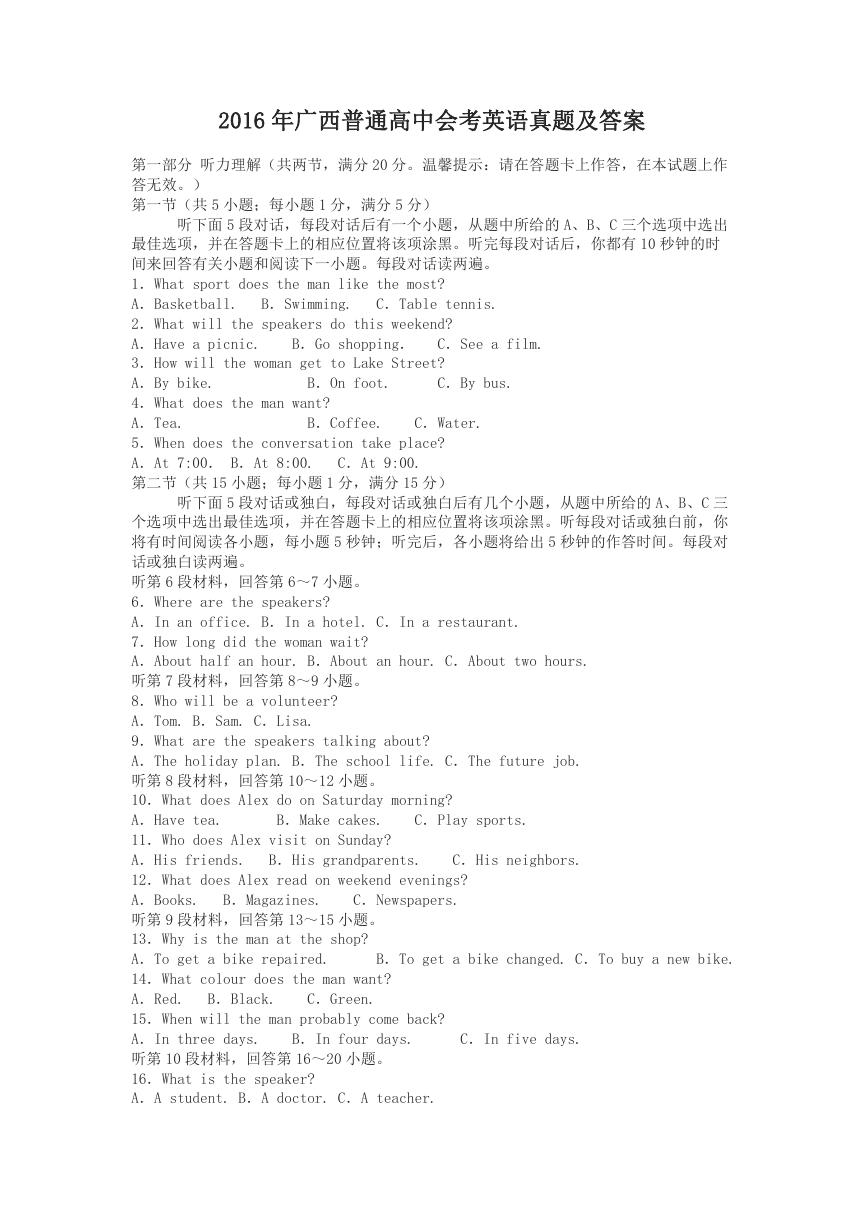
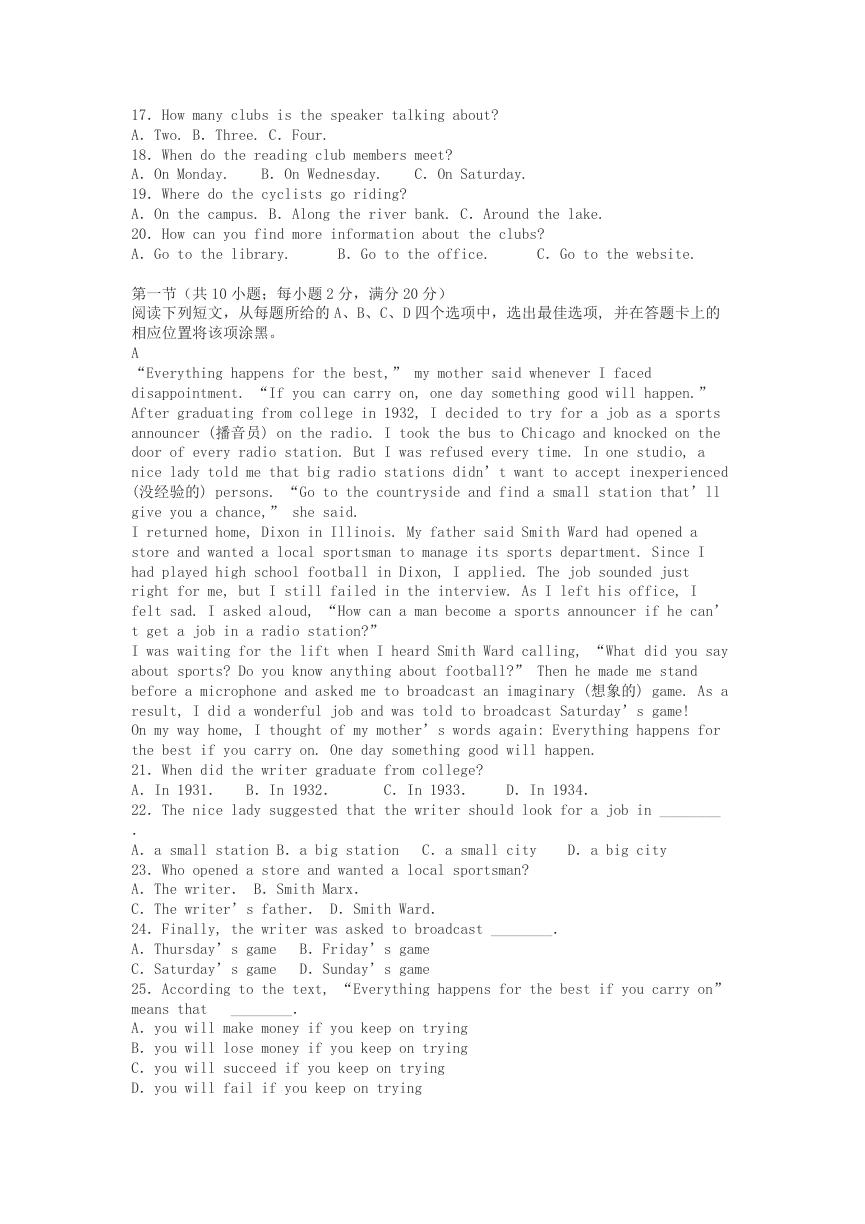
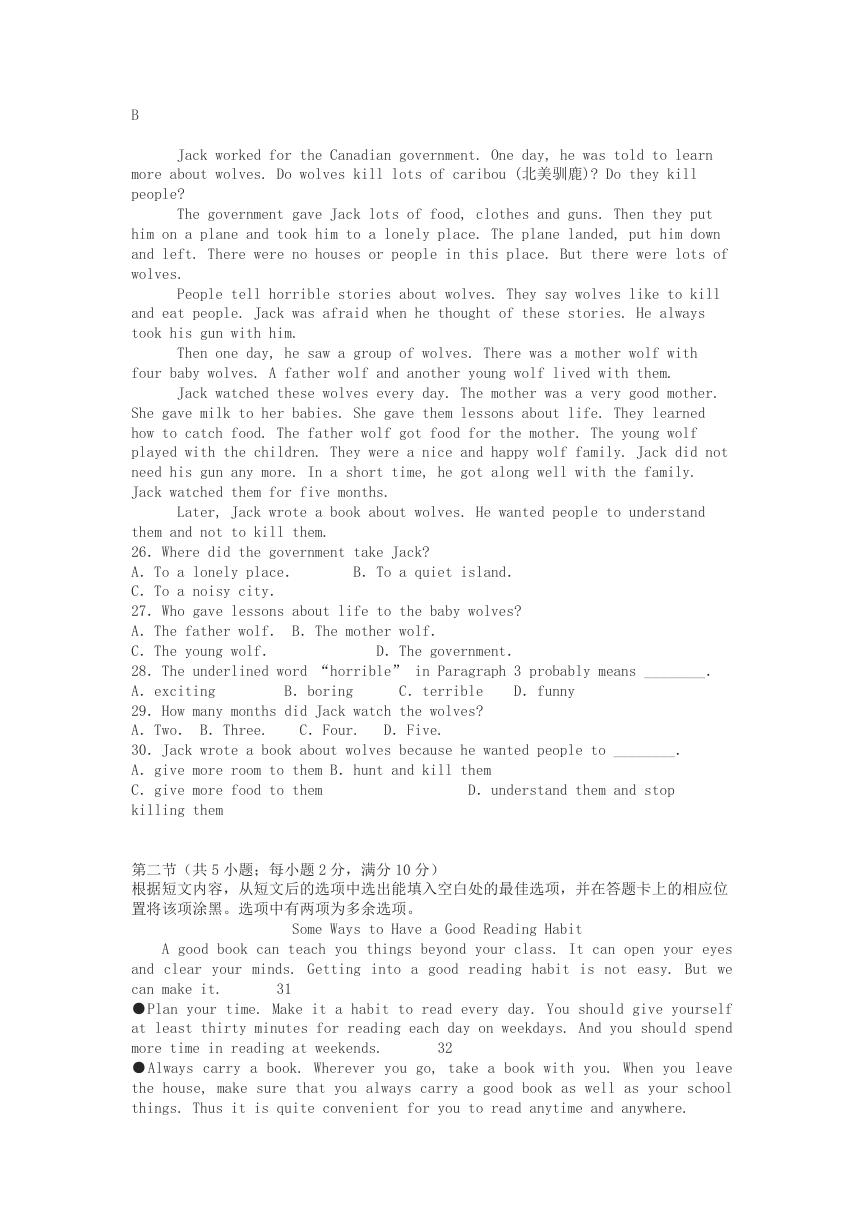

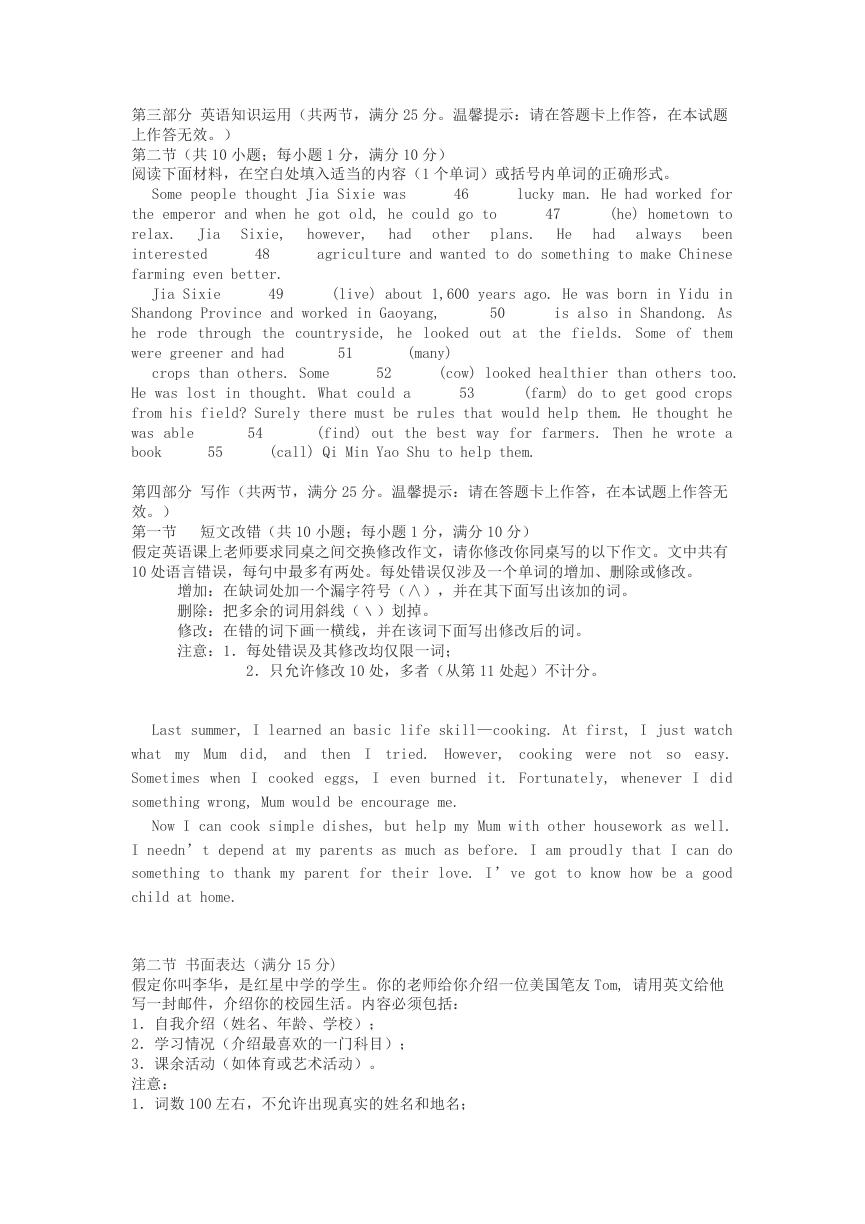
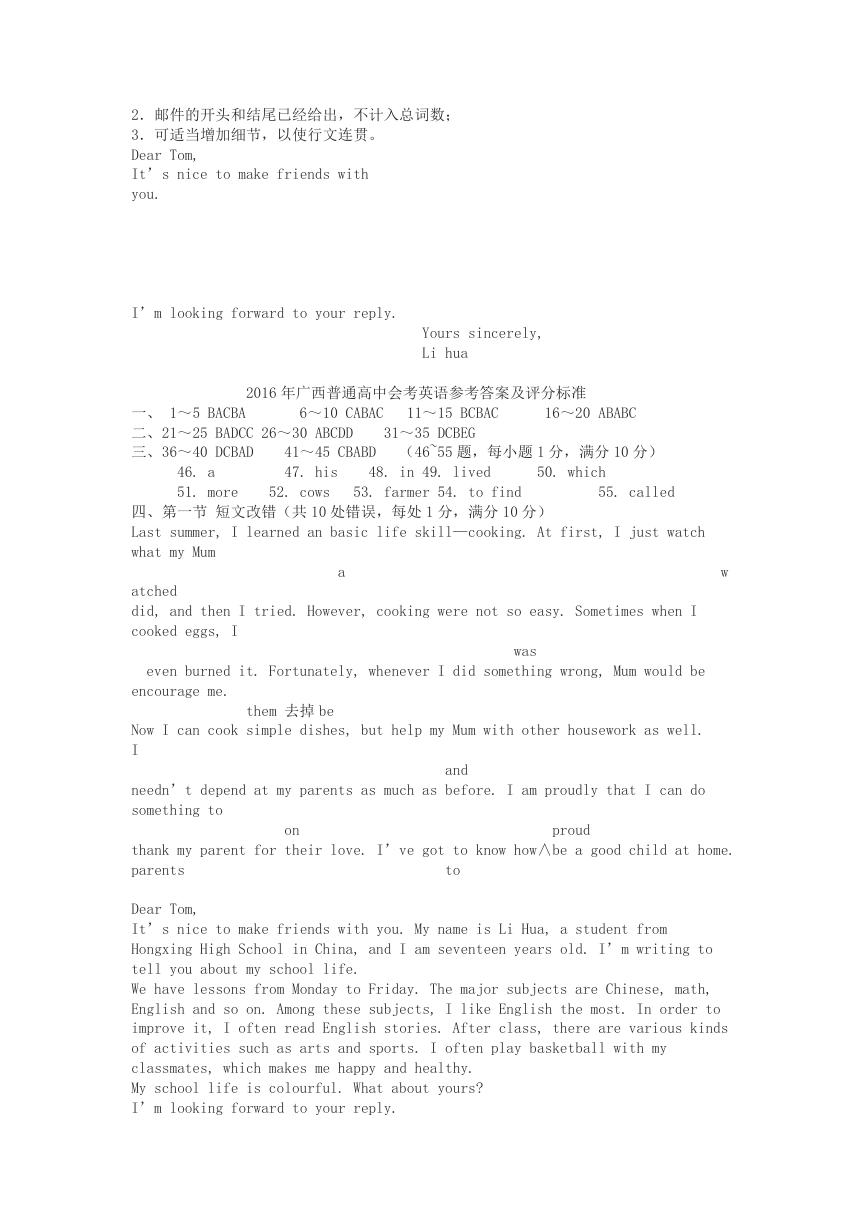
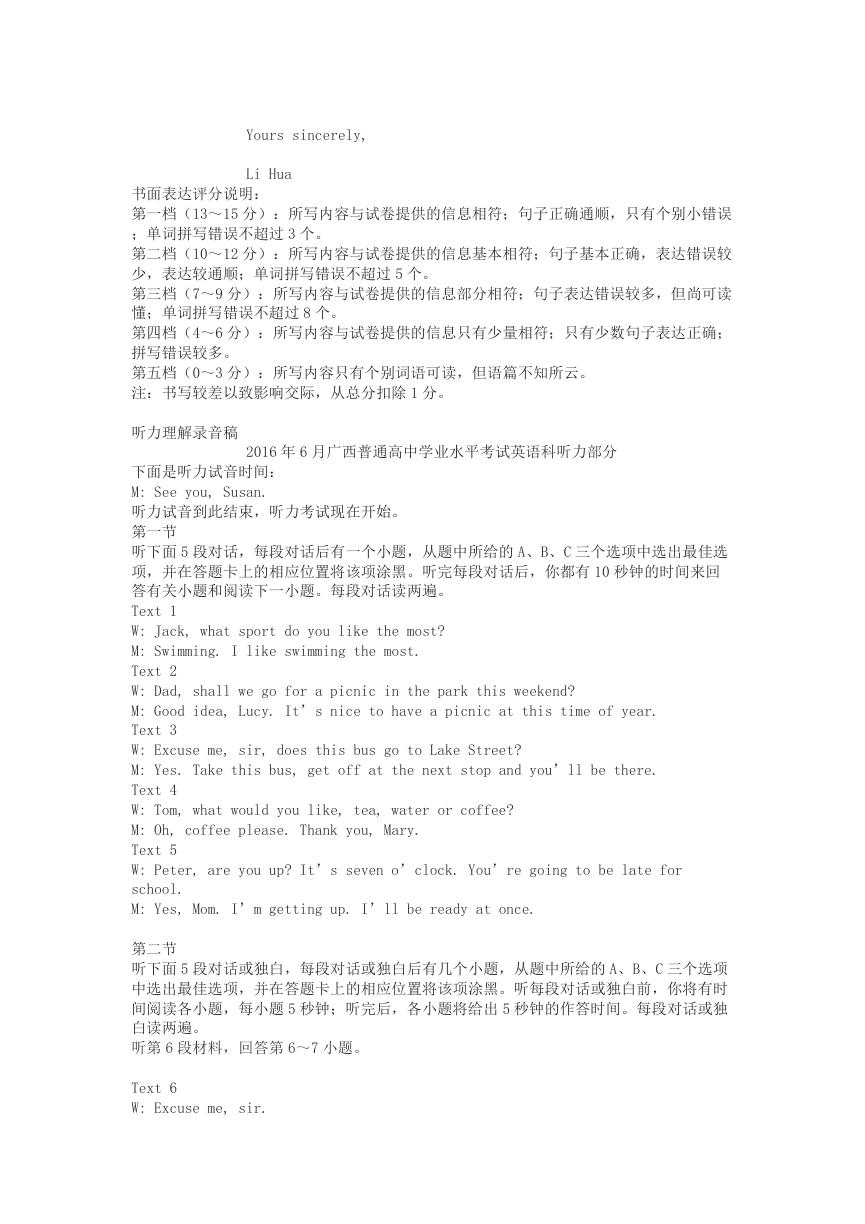
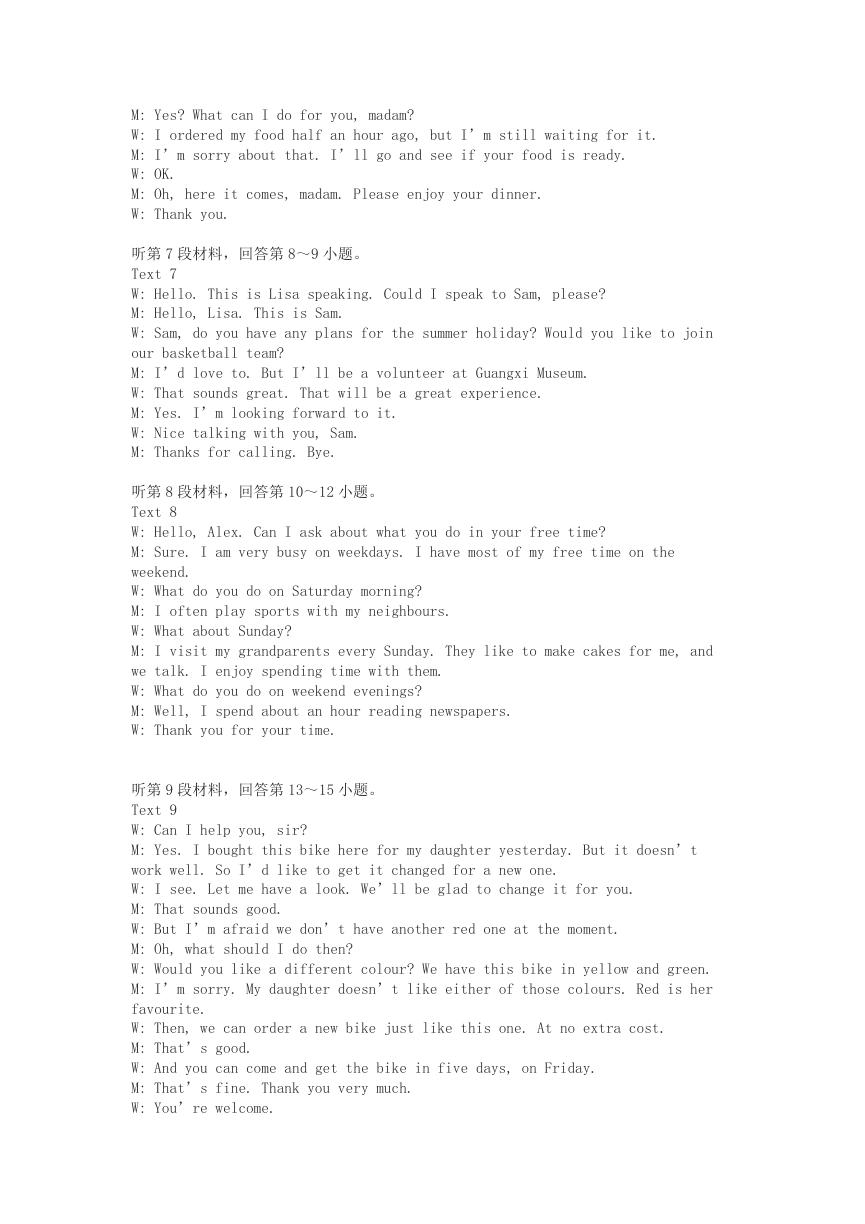








 2023年江西萍乡中考道德与法治真题及答案.doc
2023年江西萍乡中考道德与法治真题及答案.doc 2012年重庆南川中考生物真题及答案.doc
2012年重庆南川中考生物真题及答案.doc 2013年江西师范大学地理学综合及文艺理论基础考研真题.doc
2013年江西师范大学地理学综合及文艺理论基础考研真题.doc 2020年四川甘孜小升初语文真题及答案I卷.doc
2020年四川甘孜小升初语文真题及答案I卷.doc 2020年注册岩土工程师专业基础考试真题及答案.doc
2020年注册岩土工程师专业基础考试真题及答案.doc 2023-2024学年福建省厦门市九年级上学期数学月考试题及答案.doc
2023-2024学年福建省厦门市九年级上学期数学月考试题及答案.doc 2021-2022学年辽宁省沈阳市大东区九年级上学期语文期末试题及答案.doc
2021-2022学年辽宁省沈阳市大东区九年级上学期语文期末试题及答案.doc 2022-2023学年北京东城区初三第一学期物理期末试卷及答案.doc
2022-2023学年北京东城区初三第一学期物理期末试卷及答案.doc 2018上半年江西教师资格初中地理学科知识与教学能力真题及答案.doc
2018上半年江西教师资格初中地理学科知识与教学能力真题及答案.doc 2012年河北国家公务员申论考试真题及答案-省级.doc
2012年河北国家公务员申论考试真题及答案-省级.doc 2020-2021学年江苏省扬州市江都区邵樊片九年级上学期数学第一次质量检测试题及答案.doc
2020-2021学年江苏省扬州市江都区邵樊片九年级上学期数学第一次质量检测试题及答案.doc 2022下半年黑龙江教师资格证中学综合素质真题及答案.doc
2022下半年黑龙江教师资格证中学综合素质真题及答案.doc